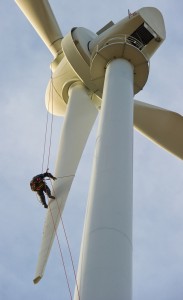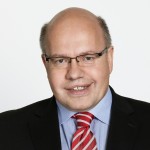Federal Environment Minister Peter Altmaier on the transition from nuclear power to renewables
 With the Energy Concept of 2010 and the decisions taken by the government and the Bundestag following Fukushima, Germany embarked on a new energy era. By 2050 we want to reduce our greenhouse gas emissions by up to 95 % and cover at least 80 % of electricity demand with renewables. We are convinced that electricity from solar, wind, geothermal and biomass sources can become the backbone of one of the world’s leading industrial locations. By 2022, we will have completely phased out nuclear power. The time of renewable, efficient energy has come. Our decisions are also at the core of the transformation to a green economy, the megatrend of the 21st century.
With the Energy Concept of 2010 and the decisions taken by the government and the Bundestag following Fukushima, Germany embarked on a new energy era. By 2050 we want to reduce our greenhouse gas emissions by up to 95 % and cover at least 80 % of electricity demand with renewables. We are convinced that electricity from solar, wind, geothermal and biomass sources can become the backbone of one of the world’s leading industrial locations. By 2022, we will have completely phased out nuclear power. The time of renewable, efficient energy has come. Our decisions are also at the core of the transformation to a green economy, the megatrend of the 21st century.
Support for this program is even higher than for re-unification over 20 years ago. 90 % of Germans are not only in favor of phasing out nuclear energy, many are even investing. Most investments are being made by private individuals, cooperatives and small-to-medium- sized companies. After years of a certain scepticism about the future and the proverbial German ‘Angst’, the transformation of our energy supply is now generating a pioneering spirit. Ambitious inventors, creative service providers and forward-looking scientists have become opinion leaders. Broad sections of the scientifi c community, industry, the environmental movement and politics have joined forces – a move made possible because long-entrenched ideological differences on energy policy have finally been overcome. Today, whether in tv discussions or at expert conferences, the question is no longer whether we should have a sustainable energy supply, but how we should attain it. Germany has opened the door to a new era of innovation and economic momentum.
Even so, as Federal Environment Minister I am aware of the huge challenges ahead. Germany, like the United States, has a federal system. At present we are in the process of harmonizing the ideas of 16 states on the expansion of renewable energies with our plans for grid expansion. This is vital in order to ensure long-term supply security. At the moment we have only just begun planning the major “electricity highways” from the offshore wind farms in the north to our centers of consumption. We have to build new distribution grids, because electricity will have to be able to fl ow in all directions. Only this will make it possible for buildings not only to consume electricity but also to generate it in suffi cient quantities. We therefore need state-of-the-art transmission technology with variable load management. There is great potential in the development of an energy Internet, a decentralized smart electricity grid that connects private homes, factories and vehicles, thus in the long term turning energy consumers into energy producers. In addition, we need greater energy effi ciency in our buildings and on our roads. We aim to put six million electric vehicles on Germany’s roads by 2030 – powered by electricity from renewables. Moreover, we must stop thinking nationally and develop a joint European energy system.
 Replacing our energy supply will take several generations and international cooperation. We are delighted by the interest from other like-minded countries. Never before have so many companies from abroad invested in our energy sector. Most of the world’s leading wind-energy companies have factories in Germany. The interest of private investors in our ideas market has never been so great, some of our largest solar power parks were set up primarily with foreign capital. Since 2011, a sum in the three figure millions from a single US pension fund has been invested in expanding decentralized biogas plants, while Swedish and French companies are helping to construct the prototype for the fi rst hydrogen hybrid power plant here. This technology can store electricity temporarily from renewables in hydrogen, releasing it as needed to generate electricity and heat. This is a breakthrough on the road to a 100 % renewables-based energy supply.
Replacing our energy supply will take several generations and international cooperation. We are delighted by the interest from other like-minded countries. Never before have so many companies from abroad invested in our energy sector. Most of the world’s leading wind-energy companies have factories in Germany. The interest of private investors in our ideas market has never been so great, some of our largest solar power parks were set up primarily with foreign capital. Since 2011, a sum in the three figure millions from a single US pension fund has been invested in expanding decentralized biogas plants, while Swedish and French companies are helping to construct the prototype for the fi rst hydrogen hybrid power plant here. This technology can store electricity temporarily from renewables in hydrogen, releasing it as needed to generate electricity and heat. This is a breakthrough on the road to a 100 % renewables-based energy supply.
I hope that we can establish even closer cooperation with strong partners all over the world. I am convinced that starting a new energy era holds major opportunities for economic growth for the United States, Israel and Germany. We should grasp these opportunities together!
